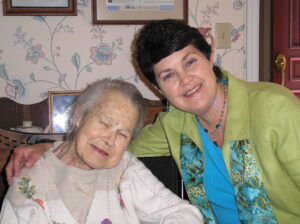
For weeks, my mother’s eyes were closed. On the rare occasions when she opened them, they were clouded with confusion, not recognizing me as her daughter. But one day, she turned her head toward me and opened her eyes. The brown irises, speckled with green, were clear and comprehending,
“Thank you for being so good,” Mama whispered. “You’ve never given me a moment’s trouble. I love you.” Then she closed her eyes, and although she lived another two weeks, she never opened them again. I cherish my mother’s last words to me.

Did we ever argue? Of course. Did we ever make each other mad? Certainly. Was I ever disobedient? Without doubt. But at the end of our time together on earth, what Mama remembered was my love and respect for her.
Mother’s Day is a bittersweet time of remembrance, thankfulness, and reflection. Am I the kind of mother and grandmother my mother was?

Sometimes Respect is Hard
The parent-child relationship is frequently challenging. We stretch parental boundaries, limits placed with love and for our protection. Many times, we test those boundaries in ways that hurt our parents and bring consequences into our lives that we later regret.
Sometimes it’s difficult to respect a parent. Perhaps words, attitudes, or actions are annoying or intentionally hurtful. Or repeated phrases or mannerisms make you slightly nuts! Does this mean you don’t have to respect? Scripture doesn’t say respect your parents “unless” and then give a list of qualifiers that permit us to treat a parent with disrespect.
However, allowing someone to harm you, physically, mentally, emotionally, or physically, even a parent, is never acceptable.
Rewards of Respect

Long life
God gave us rules for living. Exodus 20:12 (NIV) commands, but also provides a promised reward for obedience, “Honor your father and mother. Then you will live a long, full life in the land the Lord your God is giving you.”
The promise of long life shouldn’t be the only reason to respect. Honoring has many facets, including helping, acting with compassion, speaking with respect, and staying in touch in adulthood despite busy schedules and responsibilities.

Less turmoil
“Honor your father and your mother, as the Lord your God commanded you, that your days may be prolonged and that it may go well with you in the land which the Lord your God gives you” (Deuteronomy 5:16 AMP). It’s God’s desire for all to go well with us. He wants us to be happy, prosperous, and live with as little turmoil as possible.
Sometimes, we create strife with behavior or words. Do all you can to limit actions that spark turmoil.

Peace
“If it is possible, as far as it depends on you, live at peace with everyone” (Romans 12:18 NIV).
While this verse isn’t specifically about the parent-child relationship, it applies to all relationships. Sometimes we intentionally initiate conflict with our parents, but when we strive for peace in relationships, everyone benefits. This doesn’t mean never stating your opinion. It means doing so respectfully and in a way that isn’t confrontational.
Living at peace extends beyond parents. In these days, it is easy to “stir up” via social media. Some platforms are more confrontational than others. Think before you post, realizing others are intentionally inciting controversy. You do yourself a favor by not allowing your personal peace to be jeopardized by the words of others.

Guilt-free
During the months when my mother was confused and dying, it was challenging to spend time with her. I often manufactured excuses to distance myself from the heartache of her circumstances. But when I remembered how she and my father loved, supported, and encouraged me through the years, I realized I could do the same for her in the final days of her life, despite how hard it was emotionally.
Although I was helpless to change her situation, my presence was my gift to her. Because I loved and respected her, I could do this difficult thing. After she died, I was thankful I didn’t carry the guilt of abandoning her.
Respecting brings freedom from guilt, but also, in honoring, we show our love and respect for our Heavenly Father. Just as it takes time and effort to grow in our relationship with Christ, respecting our parents, and others, means nurturing and valuing our relationships with them as long as they are alive. In doing so, we set an example for the next generation, and beyond, and maintain forward motion.
©CandyArrington

Candy Arrington is a writer, blogger, speaker, and freelance editor. She often writes on tough topics with a focus on moving through, and beyond, difficult life circumstances. Candy has written hundreds of articles, stories, and devotionals published by numerous outlets including: Inspiration.org, Arisedaily.com, CBN.com, Healthgrades.com, Care.com, Focus on the Family, NextAvenue.org, CountryLiving.com, and Writer’s Digest. Candy’s books include Life on Pause: Learning to Wait Well (Bold Vision Books), When Your Aging Parent Needs Care (Harvest House), and AFTERSHOCK: Help, Hope, and Healing in the Wake of Suicide (B&H Publishing Group).
To receive Candy’s blog, Forward Motion, via email, go to https://candyarrington.com/blog/ and scroll to the bottom of the page to sign up.

